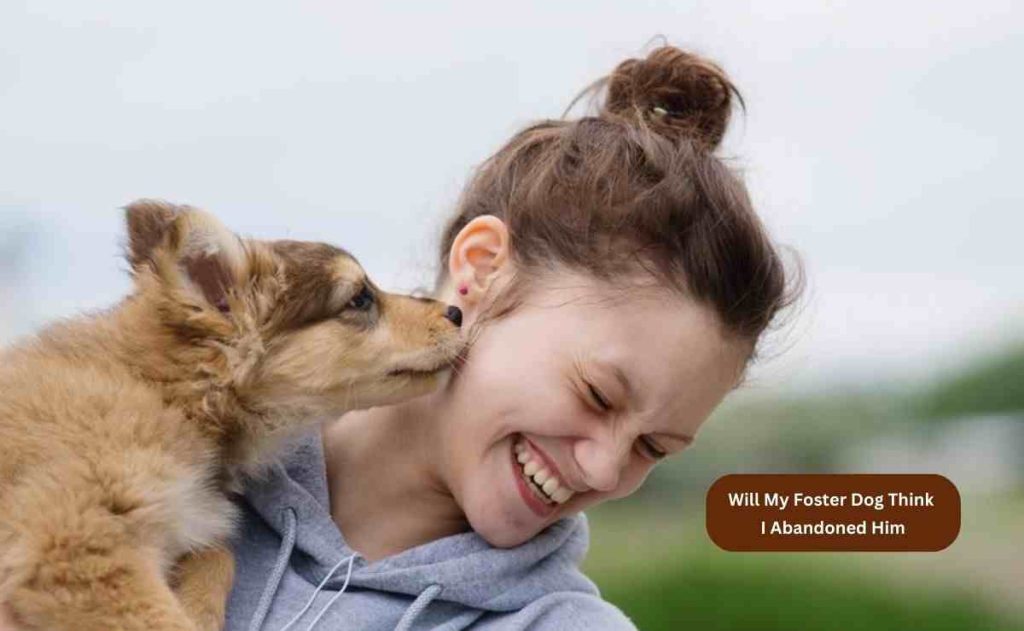Fostering a dog is a rewarding favor. You are making an impactful difference by providing support to a pet. However, the bond between humans and dogs can be stronger, and when it comes to leaving them, it’s normal to get concerned.
It’s a great pleasure if you have done this noble work. But it is a matter of concern that will my foster dog think I abandoned him.
If you have a close attachment to your dog, you will feel heartbroken while leaving. But the good news is dogs don’t feel abandoned as they can’t experience grief-level feelings. So when they are rehomed, they don’t feel abandoned or distressed.
Do Dogs Have Abandoned Feel?
Dogs do not have similar types of feelings as humans do, like abandonment. However, they have developed a remarkable ability to form deep emotional connections and can experience various emotions.
If dogs experience neglect, abuse, or sudden changes in living conditions, they feel distressed and anxious due to insecurity. Their behaviors reflect these situations and that can lead them to feel abandoned. Still, these feelings are not conceptualized in the same ways humans do.
Every dog reacts differently to changes in its environment. When they are separated from their older family, they feel a little bit distressed to see unfamiliar faces and circumstances. Every dog is different. Some may feel anxious or upset and some get more resilient and try to adapt to the new environment quickly.
Will My Foster Dog Think I Abandoned Him?

Since dogs can’t talk, it’s hard to know what’s going on in their mind. When your furry friend finds himself in a new environment or with unfamiliar caregivers, the sudden change can trigger stress and anxiety.
This stress and discomfort might reflect an “abandoned” feel. Just like us, dogs need time to adjust to change. They show signs of stress, like restlessness or whining, as they want to adapt to their new surroundings.
After foster home, some dogs show behaviors linked to stress or fear like excessive barking, chewing, or withdrawing. These reactions are the result of sudden changes in their environment. While dogs might initially feel a sense of “abandonment,” like humans, they can feel stress and change.
Every dog is unique, and their reactions vary. Some might adjust quicker, while others need more time. Socialization, positive training, and patience can make them comfortable and ultimately pave the way for a smoother journey to their forever home.
However, dogs are incredibly friendly creatures. With the right approach, you can help your foster dog feel secure and loved. Consistent care, attention, and positive support play vital roles in creating new bonds and they feel secure. By showing kindness, you’re not only easing their transition but also building a foundation of trust.
Do Dogs Remember Their Foster Parents?
Often foster parents provide so much love and security for dogs that they may not get early in life. If a strong bond has been built up between a dog and its foster parent, it’s entirely conceivable that they will miss their foster parent when moving to a new home.
You can notice a change in their behavior appetite, lethargy, or shifts in their usual behavior patterns. This indicates that your dog experiences the absence of their previous parent. Just as we yearn for the company of loved ones, dogs can also experience a sense of loss.
While they might initially miss their foster parents, they’re also capable of creating new bonds and finding joy in their new environment. The key is providing them with the same level of care, affection, and attention they’ve grown.
When does a foster dog feel at home?
While each dog’s journey is unique, the 3-3-3 rule provides valuable insights into the stages of adjustment and the gradual process of creating a sense of belonging.
In the initial three days, your newly fostered dog can show signs of anxiety and unease. This is completely normal, as the transition to a new environment can be overwhelming. You might notice that their appetite is diminished, and they might seek out a quiet corner to retreat to.
Following the three-week, they will begin exploring their new environment like tentatively sniffing around and showing interest in their surroundings. During this phase, they try to understand your routine – feeding, walking, and bathroom breaks – will solidify. This growing interest will lead to a greater sense of security and stability.
By the time three months have passed, you’ll find that your foster dog has fully adapted to their new home. They’ll have established a solid routine, and their comfort level will have increased significantly. The kindness and care you’ve provided have created a foundation of trust, enabling them to feel safe and secure.
What is the best way to say goodbye to a foster dog?
Saying goodbye to a foster dog is a bittersweet moment. To make the transition as smooth as possible, you can spend quality time with your foster dog before the goodbye.
Engage in activities they enjoy, such as playtime or walks, to create positive memories. If possible, maintain contact with the new caregivers to receive updates on your foster dog’s progress.
If the new caregivers are open to it, maintain communication and receive updates about your foster dog’s well-being. Knowing that they’re adjusting well can provide a sense of reassurance.
As you say goodbye, remember that your care has played a vital role in preparing your foster dog for its forever home. Focus on the positive impact you’ve had on their life and the exciting journey.
While the farewell might be difficult, you know that you have left a positive impact on their life. They will cherish the bond for their lifetime.
Frequently Asked Questions (FAQs)
Do dogs get attached to their foster parents?
Yes, dogs have a remarkable capacity to form attachments, and this extends to their foster parents as well. The bond between a foster dog and their caregiver can be strong and meaningful.
Is It Bad For A Dog To Be Fostered?
Fostering offers temporary shelter to dogs until they find their forever homes, freeing up space in shelters. It is a highly positive experience for dogs. They get a chance to experience love, care, and socialization in a home environment.
Conclusion
Fostering is about the well-being of the dog. Dogs, especially those who have experienced past traumas, they feel relief when get fostered.
But it feels heartbreaking when foster dogs move to their new home. So foster parents, you should not feel bad about it. Because fostering is a noble work and it helps them to adjust emotionally, mentally, and behaviorally to their new environment.
Related Posts
